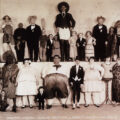50 Shades of Lydia Davis

“Sex is the brightest thread in the thick, strangely cut fabric of our lives; we can never know what it means, but we’re always sure we’re certain.”
—Edmund White
There are ways and ways to write well about sex and many more ways to fail. Most writers confront the sex dilemma sometime in their careers. Very few manage to nail it. (Salacious pun intended). What is too much detail? What too little? How does one convey the erotic in language while avoiding the gratuitous, the pornographic? As in moments of violence, we usually find ourselves skirting around the confrontation. The gun is loaded, it’s ready to fire—and we massage the hilt, uncertain how and when to pull the trigger.
Shoot too soon and the writing is burlesque, pornographic, crass. “I want you sore, baby,” says Christian Grey whose ineluctable fifty shades we witness in the E. L. James novel: “Every time you move tomorrow, I want you to be reminded that I’ve been here. Only me. You are mine.” Wait too long and we lap the curds of suppressed Victorian purience, smoldering Brontean flames: “I am bound to you with a strong attachment,” Jane Eyre says to Mr. Rochester. “I think you good, gifted, lovely: a fervent, a solemn passion is conceived in my heart; it leans to you, draws you to my centre and spring of life, wrap my existence about you–and, kindling in pure, powerful flame, fuses you and me in one.”
The need to subdue or pornographize: that is the question. But the question is more significant for a woman. It puts her very womanhood into question, assails her femininity, her ability to be a female creature roaming this earth while being other things as well: an intellectual, say, or a writer, a politician, hell, the president of the fucking United States. As a sexual woman, I have no problem with opacity or bold-faced fetish. As a sexual woman: I have no problem with subtlety and subterfuge, either. But as a writer, a woman writer of (presumably) literary fiction, who happens to like sex an awful lot, I have a problem with both.
For, it is in this too much/too little binary that we find ourselves skirting the line between feminism and misogyny, between brash whore and tight-buttoned saint, between the angel and the witch. What we need is writing that is true to both and neither. Words that encapsulate the condition of yearning, but do not trivialize or exploit desire. We need to be able to be sexual without, so easily, being sexualized; to be also sexualized without being objectified. So what makes good sex writing and how do we go about tackling sex in literary fiction? Nabokov famously did it. Henry Miller, and Anais Nin. One thinks of Lady Chatterley and Emma Bovary, or of de Sade, and to a more or lesser extent, of Pauline Réage and Erica Jong.
Lydia Davis, not typically included in any list of “sexy” writers, has built her reputation on seemingly characterless micro-fiction. It’s not that the stories are without character(s), but that her characters are unnamed, ubiquitous, and often remote. They are creatures built from language, not purveyors of it. In Davis’s world, character may serve content, but content is always a slave to form, and form engenders philosophy more than plot. Of course, sex is not philosophy (less Freud pop up) nor can sex be encapsulated entirely in plot or character. Yes, we do think of characters—but less of humans with names than of bodies bristling against and tangling into other bodies. And this is what we get, or something like it, in Davis’s novel, The End of the Story. In the absence of a former lover, the narrator beds a gentleman stranger she meets one night. Seeking pleasure in the unfamiliar, she concedes after the encounter that it was “not either pleasant or unpleasant, in the end, just something to watch and wait out”:
There was no confusion of our bodies. I knew which arm was his and which mine, and which leg, and which shoulder. I did not lose track and kiss my own arm, or whatever came near my mouth. The smallest motion did not immediately lead to another motion. It was not endless, I did not go more and more deeply into my body and his body as though to go as far as possible from my mind, and his mind, so conscious, so unrelenting. It did not end while it was still in the middle.
This is the closest we will come to Lydia Davis erotica. Or should we call it, “autoerotica?” For even in the arms of a new lover, a moment typically teeming with curiosity, discovery, tantalization (or quite possibly repulsion), Davis’ narrator is not subsumed by that other. Rather she becomes more conscious of and more fully attuned to herself. There is no confusion, no endlessness of bodies. These two—man and woman—are only ever two separate bodies, and these two bodies remain estranged even in the most intimate of moments. In fact, the narrator spends much of her lovemaking comparing the man to her familiar, former lover. It is a condemnation of the traditional literary sex scene.
Elsewhere in her work, though, Davis hints at a different kind of eroticism, one bred by familiarity. How many of countless ladies magazines circulating the racks warn us of sex becoming stale in marriage, give us tips on how to spice up our bedroom habits, role-playing, acting out, defamiliarizing ourselves from and for our partners? Yet in her story “This Condition,” Davis elicits arousal from the seemingly mundane. Amidst the typically cerebral white-space narratives of Almost No Memory, Davis’ soberly eclectic second collection of flash fiction, she transforms sex into a condition. Not a singular encounter, but an ongoing state of encountering. In typical fashion, “This Condition” is a story of form and matter, of white space and what’s left unsaid. But it is surprisingly sensual (unexpected for Davis), a prose-poetic enumeration of commonly unrecognized aphrodisiacs:
In this condition: stirred not only by men but by women, fat and thin, naked and clothed; by teenagers and children in latency; by animals such as horses and dogs; by certain vegetables such as carrots, zucchinis, eggplants, and cucumbers; by fruits such as melons, grapefruits, and kiwis; by certain plant parts such as petals, sepals, stamens, and pistils; by the bare arm of a wooden chair, a round vase holding flowers, a little hot sunlight, a plate of pudding,
The catalogue builds upon itself organically at first from the obviously sexual—men and women, animals, phallic vegetables and yonic fruit, the reproductive organs of flowers—to the surprisingly mundane—wooden chair, vase, sunlight, pudding. (Pudding?) Perhaps the link between physical and sexual hunger works here as it does with the fruit and veggies before it, but what of the wooden chair? Already, Davis induces us to imagine our daily brushes with texture a form of unconscious, overlooked arousal. The story begins with an index of fetish objects (nouns) before dressing them in modifiers or giving them action. Not simply a chair, but the bare arm of a wooden chair; a round vase; a little hot sunlight. Now these are the adjectives of sex writing, something we can sink our teeth into. Or are they?
What follows is an act of recursion that boggles the erotic imagination. Words are repeated, but with each repetition given new meaning: naked men and women become naked tree limbs, the bare arm of a wooden chair becomes “a hand alighting on a bare shoulder,” and things “bare and shining, as limb or bole of a tree.” The process is a gradual tangling and untangling of the erotic with the mundane. Davis disrupts our primal, clichéd expectations with exemplification. She stimulates our anticipation and then thwarts it:
by any touch, as the touch of a stranger handling money; by anything round and freely hanging, as tassels on a curtain, as chestnut burrs on a twig in spring, as a wet teabag on its string; by anything glowing, as a hot coal; anything soft or slow, as a cat rising from a chair; anything smooth and dry, as a stone, or warm and glistening; anything sliding, anything sliding back and forth; anything sliding in and out with an oiled surface, as certain machine parts, anything of a certain shape, like the state of Florida; anything pounding, anything stroking; anything bolt upright, anything horizontal and gaping, as a certain sea anemone; anything warm, anything wet, anything wet and red, anything turning red, as the sun at evening; anything wet and pink, anything long and straight with a blunt end, as a pestle;
We are offered the trappings of sex writing—words like glistening, sliding, pounding, stroking, gaping—and shocked by the worldly objects being sexualized. It’s like that old riddle: “What’s black and what and read all over?” Only here it’s: “What slides, slides back and forth, what slides in and out with an oiled surface?” The answer is “certain machine parts.” Only Davis’s slippery, often stoic attention to language could make fetish objects of curtain tassels, pestles, a cat, a tea bag, the entire state of Florida—and make fetishists of us all.
The story is really a single, prolonged sex act. And yet it is not. It occurs in a realm of timelessness: ubiquitous and singular. These are things we encounter perhaps, in a single day, but more likely over the course of many days: a lifetime. This accumulation of raw and familiar imagery and language builds the anticipation and stimulation in the reader. And not once are we given bodies bristling against each other. If this is what we find in the story—bodies bristling—that’s because of the baggage we bring to it. Especially in the end, as the story—dare I say—swells, climaxes, refracts:
anything opening; any stream of water running, any stream running, any stream spurting, any stream spouting; any cry, any soft cry, any grunt; anything going into anything else, as a hand searching in a purse; anything clutching, anything grasping; anything rising, anything tightening or filling, as a sail; anything dripping, anything hardening, anything softening.
This is not the shuddering of loins typically associated with (rotten) sex writing; rather, it is the frisson of world against skin, beauty against mind, word against word. In other words, we are always already accosted by arousal, by this erotic condition.
In a New York Times article, novelist Geoff Dyer writes: “Sex scenes are difficult to write partly because the choice of verbs and nouns is so limited. You can mint new verbs—one of Martin Amis’s characters speaks of having ‘Mailered’ a woman—but this tends to take us into the realm of comedy, and sex, if it’s going well, is not comic.” Davis takes ordinary verbs, adjectives, and nouns—words common to the genre of erotic and pornographic literature—and rearranges them to offer new and surprising meanings. She targets our desires and triggers them without every pulling a thing but the cloak from out over our erotic imaginations. In her hands, the grey mutations of monotony turn wet and pink and red, and our pedestrian tasks—cooking, cleaning, adjusting a curtain—take on the glint and glow of sexual promise.
Housewives have escaped routine through burlesque romanticism for years, but Davis asks us turn our attention toward what is in front of us, what we daily finger and caress, to what we are bound to rather than bound by. Through Davis’ stories, we are able to trawl out the epiphanic chromes of the mundane; we do not need to rely on the whims of a Christian Grey—a privileged white man—to whisk us away on his jet, carriage, or horse. To find sex in everything, everywhere, all at once and over and over again, is to be tuned to the erotic of the everyday, willing to touch and taste and smell and fuck, even when the sex is in our own minds, or when the thing we are tasting and smelling is too familiar or too boring or too real to be what we have always imagined fucking to be. Really.
About Leigh Bennett
Leigh Bennett recently completed her MFA in Fiction at Bennington College. She lives in Boston where she teaches words, books, and the Oxford comma to unsuspecting undergrads. Her fiction can be found in Cutbank, Vestal Review and, with any luck, the future.





